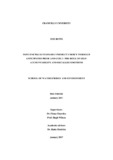JavaScript is disabled for your browser. Some features of this site may not work without it.
| dc.contributor.advisor | Charnley, Fiona | |
| dc.contributor.advisor | Wilson, Hugh | |
| dc.contributor.advisor | Dimitriu, Radu | |
| dc.contributor.author | Rowe, Zoe | |
| dc.date.accessioned | 2022-05-11T10:12:28Z | |
| dc.date.available | 2022-05-11T10:12:28Z | |
| dc.date.issued | 2017-01 | |
| dc.identifier.uri | http://dspace.lib.cranfield.ac.uk/handle/1826/17880 | |
| dc.description.abstract | Consumption choices are significant in determining sustainability outcomes. Therefore, an area of particular interest for both scholars and practitioners is that of consumer behaviour and the challenge of encouraging sustainable consumption habits. Sustainable consumer behaviour is important, yet slow to change, with many individuals stating that they care about being sustainable, yet not demonstrating this in their actual behaviour choices. This research proposes two related new theoretical routes to sustainable product choice, namely through self-accountability and through recalled emotions. First, a systematic review of the extant literature was deemed necessary. A conceptual framework was developed that identified the antecedents to and moderators of sustainable behaviour change, informing a number of testable propositions and future research directions. Moreover, this synthesis uncovered the gaps in current knowledge that informed the research question and design of the empirical research that follows. Adapting aspects of self-standards and self-discrepancy theory, the second stage of this research explored the construct of self-accountability for influencing anticipated pride and guilt about sustainable purchase behaviours, and thereby influencing the behaviour itself. Two field surveys tested a number of structural models to measure the effect of self-accountability on purchase intentions, mediated by feelings of anticipated pride and guilt. The results found that consumers with higher levels of self-accountability are more likely to be influenced by anticipated feelings of pride towards the outcome of sustainable purchase behaviour. The third part of this research tested a manipulation of recalled pride and guilt across two experimental studies, to explore their effect on feelings of anticipated pride and guilt and hence on sustainable purchase intentions. The studies showed that the manipulation of recalled pride was more significant than that of recalled guilt, as compared with a neutral recall, in influencing purchase intentions. There was a significant mediation effect of both anticipated pride and guilt, with anticipated pride again showing higher significance. Overall, this research highlights the significant role of pride and guilt for encouraging sustainable purchase choices. Specifically, it highlights the superior role of pride and offers two complementary mechanisms for engendering feelings of anticipated pride and guilt. A manipulation is proposed whereby appraisal of pride and guilt can be a suitable mechanism to trigger sustainable purchase intentions, contributing to both theory and practice. | en_UK |
| dc.language.iso | en | en_UK |
| dc.rights | © Cranfield University, 2015. All rights reserved. No part of this publication may be reproduced without the written permission of the copyright holder. | |
| dc.title | Influencing sustainable product choice through anticipated pride and guilt: the role of self-accountability and recalled emotions. | en_UK |
| dc.type | Thesis | en_UK |
| dc.description.coursename | PhD in Water including Design | en_UK |
